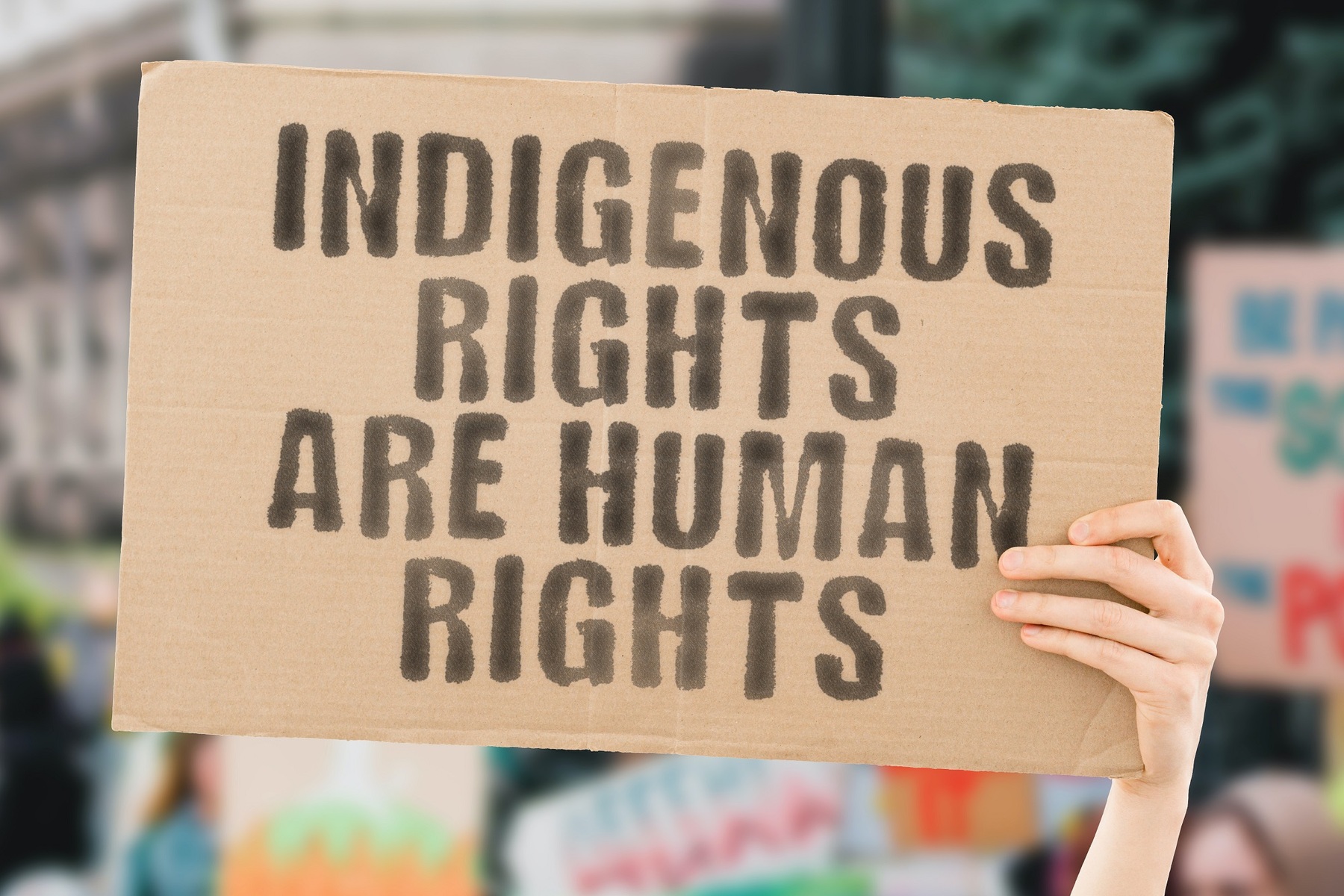
Passed by Congress in 1978, The Indian Child Welfare Act (ICWA) faces an existential threat from the current Supreme Court case Haaland v. Brackeen. The Justices heard oral arguments in November, the Court’s decision will be announced soon. Despite the success of this policy in remediating harms associated with the disproportionate targeting of Native children for adoption, particularly by non-Native families, some White Texas adoptive parents and the state of Texas argue that the policy operates on racial preference and impedes state autonomy.
Political Science major Sophia Doran, who just completed her Freshman Year at UIS, chose to write about this contemporary issue in her paper “The Indian Child Welfare Act and the Dangers It Faces” submitted to Dr. Isabel Skinner for a new Race and Ethnicity Politics course offered online by the School of Politics and International Affairs. This post includes excerpts from Doran’s paper edited and with additional content by Dr. Skinner.
The targeting of indigenous peoples runs deep through American history and was especially prevalent in the 19th century. Policymakers developed a new way to strip indigenous peoples of their identity by forcibly separating families and placing Native children in boarding schools. In these boarding schools, officials hoped to “re-educate” children by pushing Western ideologies and ways of life onto them. US officials also framed Native mothers negatively by critiquing their nurturing skills, child rearing, and housekeeping (Jacobs 139). After boarding schools were phased out, officials relied heavily on this framing to continue to pursue the removal of Native children through adoption. Chief of the Cherokee Nation, Chuck Hoskin Jr., estimates "About a third of native children were adopted away through ... child welfare agency actions….And of that group, about 85% were adopted outside of tribal families (Totenberg)."
For example, the Indian Adoption Project (IAP) allowed the interstate adoption of Native children. This practice became so rampant that “in Minnesota between 1971 and 1972, one out of every four Indian children…was placed up for adoption. Over this same period, Indian children adoptions were five times greater than that of non-Indian children, and…approximately ninety percent of these Indian children were placed with non-Indian parents (Phillips, 352).”
It took until the 1970s for activists’ successful intervention on behalf of Native children and tribal cultural preservation. William Byler, executive director of the Association on American Indian Affairs, presented Congress with numerous statistics explaining the inhumane treatment of Native families and children (MacEachron et al. 453). After extensive testimony, Congress ultimately agreed with Byler and passed the Indian Child Welfare Act in 1978 (MacEachron et al. 454).
ICWA protects Native children by reinforcing their tribal rights through the: “…establishment of and adherence to minimum standards in order to remove Indian children from their families; placement of Indian children in homes that reflect the unique values of Indian culture; and government assistance for child and family service program” (Phillips 354). This is arguably the first time the US government recognized the value of indigenous cultural preservation. Additionally, the ICWA banned from consideration damaging stereotypic rationales for the adoption of a Native child including “generic poverty, alcohol abuse, or nonconforming social behavior (MacEachron et al. 454).”
ICWA has been successful in its goal of reducing the disproportion of Native children removed to non-Native homes, and evening out the adoption rates of Native to non-Native children in general (Day et al. 14; MacEachron et al. 457). The harms experienced by Native children removed from their families and tribal contexts are numerous. For example, research has found that Native adults who were sent to boarding schools reported “… a prevailing sense of despair, loneliness, and isolation from family and community,” on top of physical health complications (Gallegos and Fort 2).
Today, Native children have a suicide rate twice as high as the national rate and placing Native children in non-Native households has been shown to yield negative health consequences for the child including heightened rates of depression and lower self-esteem (Gallegos and Fort, 2). Conversely, tribal, familial, and cultural connections have been shown to benefit Native children and adolescents’ mental health and behavior (Gallegos and Fort 3).
Again, despite the continued utility of ICWA, this policy is currently at risk of elimination in the case Haaland v. Brackeen (Van de Venter). White, non-Native adoptive families from Texas are claiming the Act is unconstitutional as it operates on racial classification preference in violation of the Equal Protection Clause under the 14th Amendment, and it impedes states’ rights. This is in spite of the fact that, as journalist at Cherokee nation member Rebecca Nagle explains, Native or “American Indian” status and tribal membership, while typically based on ancestry, is a political rather than racial categorization (Parker et al.).
Also, paradoxically, Nagle observes that, in all but one instance, the White couple plaintiffs in this case won their previous custody cases to adopt Native children yet maintain a complaint of discrimination. Jennifer and Chad Brackeen are the namesake plaintiffs in this case. They fostered a Navajo and Cherokee baby boy but adopted him soon after the birth parents terminated their rights to him. Now, after a baby girl from the same family has been placed in the foster system, the Brackeens are trying to adopt her, despite objections from her tribe and great-aunt. The Brackeens believe the girl is best off living with them and her brother, whereas the Navajo (Diné) believe she is better off with the tribe (Totenberg).
Additionally, this plaintiffs’ argument emphasizes state rights yet disregards the legal tradition of tribal sovereignty. Legally, the relationship between the US and recognized Native tribes is one that treats tribes as sovereign entities much like foreign governments that exist within the bounds of states and the United States. Tribal citizens are also US citizens since the passage of the Dawes Act of 1880. As the US Bureau of Indian Affairs explains, “[In the] 1830's, U. S. Supreme Court Chief Justice John Marshall articulated the fundamental principle that has guided the evolution of federal Indian law to the present: That tribes possess a nationhood status and retain inherent powers of self-government (bia.gov, emphasis original).” According to SCOTUSblog reporter Amy Howe, Justices Coney Barrett, Gorsuch, and Kagan all mentioned the “plenary” or absolute power of Congress to regulate Indian Affairs and seemed therefore skeptical of the argument by the plaintiffs’ lawyers that Congress overstepped with ICWA four and a half decades ago (Howe).
As Rebecca Nagle described to B.A. Parker on the Code Switch podcast by NPR, “Native kids have been the tip of the spear in attacks on tribal sovereignty for generations (Parker et al.).” If ICWA is struck down, Native children may face serious consequences, as has been seen in the past, and all tribal rights will fall under scrutiny. In sum, the Indian Child Welfare Act is one of the strongest protections in place for Native children, and its elimination would once again endanger one of the most vulnerable race and age groups in the US.
The existential threat faced by ICWA comes at a time of nationwide organizing calling attention to the “silent genocide” of missing and murdered indigenous people, particularly women (see the Association of American Indian Affairs' Violence Against Natives resource page to learn more).
While, as mentioned previously, there are distinctions between the issues facing indigenous communities and those impacting racial and ethnic minorities in the US, this case resonates with several themes from the course Doran took offered by Dr. Skinner in the School of Politics and International Affairs. Race and Ethnicity Politics (REP) is a subfield of Political Science dedicated to “major theories and empirical approaches [to] the study of race and ethnicity as political identities” (University of California, Berkeley
Key themes arising from the course which relate to the situation described here include the shift from explicit and biology-based forms of racism to modern symbolic and cultural justifications for discrimination against racial minority groups. ICWA helps challenge problematic rationales for removing Native children which are consistent with what scholars would term “modern eugenics” or the belief that socialization of children by poor, female-headed, or otherwise marginal or “undesirable” groups leads to negative behavioral, physical, and intellectual traits (Pierson-Balik 12).
Furthermore, this course unpacks how public policy issues and even social groups are constructed through communication, public perception, and the law. In Haaland v. Brakeen, the very concepts of indigenous identity and tribal sovereignty are in question and the 14th Amendment is invoked ironically to preserve the Equal Protection of White Americans. Finally, the course addresses the non-linearity of social change and the reality that even hard-won rights can be rolled back.
"Let us put our minds together and see what kind of future we can build for our children"
-Chief Sitting Bull, Sioux, 1867
Authors:
Sophia Doran is a Political Science major who just finished her Freshman year at UIS.

Isabel Skinner is an Assistant Professor in the School of Politics and International Affairs at UIS. Dr. Skinner received her PhD. in Government and Public Policy from the University of Arizona. Dr. Skinner's expertise is in American Politics, political behavior, and public opinion. Her research interests include immigration and refugee issues, race and ethnicity politics, and political psychology topics including attitude formation and the reception of political communication. Her work has been published in American Political Science Review, Public Opinion Quarterly, and International Journal of Public Opinion Research.
References:
Day, Angelique, et al. “The Indian Child Welfare Act: Lasting Legacy, Current Practice.” Children’s Voice, vol. 28, no. 1, 2019, pp. 12–15. JSTOR,
“Frequently Asked Questions.”US Department of the Interior Bureau of Indian Affairs.
Gallegos, Joaquin R., and Kathryn E. Fort. “Protecting the Public Health of Indian Tribes: The Indian Child Welfare Act.” Harvard Public Health Review, vol. 12, 2017, pp. 1–7. JSTOR.
“Haaland v. Brackeen.”Oyez.
Howe, Amy. “Closely divided court scrutinizes various provisions of Indian Child Welfare Act.” SCOTUSblog. November 9th, 2022.
Jacobs, Margaret D. “Remembering the ‘Forgotten Child’: The American Indian Child Welfare Crisis of the 1960s and 1970s.” American Indian Quarterly, vol. 37, no. 1–2, 2013, pp. 136–59. JSTOR.
MacEachron, Ann E., et al. “The Effectiveness of the Indian Child Welfare Act of 1978.” Social Service Review, vol. 70, no. 3, 1996, pp. 451–63. JSTOR.
Parker, B.A. et al. “The Implications of the Case Against ICWA”. NPR Code Switch (podcast). May 17th. 2023.
Philips, Sloan. “The Indian Child Welfare Act in the Face of Extinction.” American Indian Law Review, vol. 21, no. 2, 1997, pp. 351–64. JSTOR.
Pierson-Balik, Denise A. “Race, Class, and Gender in Punitive Welfare Reform: Social Eugenics and Welfare Policy.” Race, Gender & Class, vol. 10, no. 1, 2003, pp. 11–30. JSTOR,
“Race and Ethnic Politics.” The Charles and Louise Traver’s Department of Political Science, Berkeley. 2021.
“S.1214 - Indian Child Welfare Act”. US Congress.
Totenberg, Nina. “Supreme Court Considers Fate of Landmark Indian Adoption Law.” NPR, 8. Nov. 2022.
Van de Venter, Karlee. “Tribes across the Country Await Supreme Court Decision on Indian Child Welfare Act.” NBC Right Now, 24 Mar. 2023.
“Violence Against Native Peoples”, Association on American Indian Affairs. n.d.


